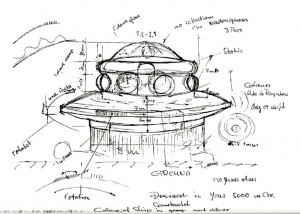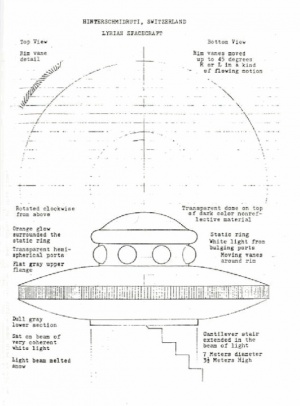Billy
My next question refers to what you have already explained during my — that is, “our” - first meeting (contact 1). People on Earth will never be capable of travelling into the true, deep outer space unless they invent another method of propulsion. I can only imagine what you mean with the term propulsion, e.g. that it must involve a form of beam drive - a hyper-drive, so to speak. In my opinion it would need to consist of a drive that alters matter in some way, probably while the speed of light is exceeded. In the process, the beamship is hurled into hyperspace, in which space and time are paralysed, as you have already explained. I assume that space and time collapse in a manner whereby they are somehow completely nullified.
Semjase
30. You would make a great scientist.
31. This is really phenomenal considering that all of your knowledge is based on autodidactic work.
32. You are completely correct in your assumptions.
33. To travel through real outer space, one needs a drive that surpasses the speed of light many times over.
34. This propulsion can only become activated, however, when the speed of light has already been reached.
35. As a result, another drive is needed to regulate the normal speed up to that of light.
36. This means then that a beamship needs two propulsion systems: first, a normal drive which permits acceleration up to and below the speed of light and, second, a hyperdrive as you call it.
37. A drive, therefore, which generates a velocity a million and billion times that of light; the hyperspeed, which enables us to enter hyperspace.
38. A space in which every mass expands in proportion to the increase in speed.
39. Consequently, time and space collapse and they become null-time and null-space.
40. That is to say:
41. Space and time simply cease to exist.
42. And exactly by this manner is created the fact that distances of countless light-years can be traversed in a fraction of a second without causing a shift in time.
Billy
Does this mean then that the same amount of time passes for a beamship and its passengers as it would on the home planet or on some other planet or star?
Semjase
43. Surely.
44. For example, when we leave our Pleiades (Plejares) and require about seven hours to get to Earth, then seven hours pass on our own planet and on Earth, as well.
45. It takes us this long because we must first fly with the normal drive beyond the reach of the planets; only then, faraway in space, can we convert to hyperspeed.
46. A long way from your solar system (Sol star system), we exit hyperspace and convert to normal propulsion as we continue to fly here.
47. We are never allowed to penetrate hyperspace too close to a planet.
Billy
I understand. The penetration into hyperspace would likely draw one or more planets into hyperspace and eject them as deadly projectiles when the beamship breaks free from hyperspace. Maybe that's how various huge comets turned into storming and dangerous cosmic speedsters — through the fault of irresponsible star travelers?
Semjase
48. You are partially correct:
49. Actually, hyperspace may only be penetrated very far in outer space, otherwise, planets would be pulled in.
50. Also, concerning the exit from hyperspace, you figured it out entirely correct.
51. It is also a fact that some comets originated in this manner, but only a few; most of them were guided on their dangerous path by other natural events.
52. In this case you are only partly right when you assume that all comets originated in this manner, as you perhaps suspected.
53. But the fact is, such events are caused by irresponsibility, because it exists throughout outer space, not only on Earth.
54. Irresponsibility is evident also when new highly developed intelligences perform their first ventures into hyperspace too close to other planets.
55. The safety rule is calculable and states that hyperspeed is only to be initiated 153 million kilometers (95,625,000 miles) away from the nearest planet.
Billy
This is very interesting, but I did not suspect that all comets resulted in the manner you mentioned. But how does such a hyperdrive work, and what about the normal drive?
Semjase
56. I am not at liberty to give you specifics on this, unfortunately.
57. If scientists on Earth obtained more details, they would resolve their propulsion problems in a very short time.
58. This is neither in our nor the cosmic interest, for the Earth human is still not liberated and mature enough to fly into space.
59. But at the given time, which isn't very far off, he will find the solution to his problem himself.
60. I am only permitted to tell you that many of your scientists are already on the right track and are theoretically working at and researching the necessary propulsion systems.
61. I may tell you also that, in some basic form, these propulsion systems are already known in outline form to your scientific community as light-emission and tachyon drives.
62. The light-emission drive serves as normal propulsion and has the function of propelling the beamship onto planets or within their vicinity, up to the 153 million kilometre distance – the safe distance, that is.
63. Then the tachyon drive, among others, is activated when greater distances need to be traversed.
64. This is one of the hyperdrives which are capable of conquering hyperspace and space and time.
65. We call both of these propulsion systems by other names, but the meaning is the same.
66. We have a different language than people on Earth, and for this reason I need to explain it to you in terms you can understand.
Billy
That stands to reason, but I do not understand how such a drive functions. I am familiar with the basics of emission and I know what tachyons mean, yet I cannot imagine or guess their actual processes that result in propulsion. Can you tell me more about it?
Semjase
67. No, I am not allowed to do so because it would reveal the secret of the whole propulsion system and the generation and harnessing of tachyons, along with the secret of the emission drive.
Billy
Thanks, that'll do, as I don’t want to pressure you. One thing still interests me, though: As I assess and ponder it carefully, the form of the beamship plays no decisive role, and yet a disk-like ship would be the ideal shape because surely, in the atmosphere, it offers the least aerodynamic resistance, which might also be the case in water.
Semjase
68. Certainly. You have hit the nail on the head again.
69. Basically, though, the form really makes no difference.
70. However, the disk shape ensures the least resistance in an atmosphere, and besides, it offers the largest surface and best shape that allows the drives on them — or through them — to become fully effective.
Billy
This seems clear to me, but how is it possible for a beamship to attain immense speeds within the gravity field of a planet or in its atmosphere without burning up, or having the passengers succumb to the immense pressure?
Semjase
71. This is very easy to explain and no secret any longer to the Earth human, at least not to the scientists:
72. The beamship is surrounded by a radiation protection shield that causes every little current of air to glide off without pushing against it.
73. The same thing also occurs in outer space, which simply swarms with inconspicuous particles.
74. Thus, this radiation protection shield has the purpose of protecting the beamship against extraneous influences and resistance, without destroying or pushing against anything that collides with the shield.
75. Anything that penetrates or offers resistance is simply deflected without pushing against it.
76. Pushing against it would mean resistance and would remove the possibility of unlimited speed.
77. Through the deflective quality of the radiation shield, another important effect is triggered which is of great and vital importance to the passengers.
78. The deflection technique of the radiation shield simultaneously neutralizes the gravitational force of a planet.
79. But this does not mean that gravity is simply destroyed, pushed aside or nullified.
80. The air, as well as some rays or particles and magnetism, etc, are simply deflected in the same way; as a result, its own normal gravitational and attraction forces prevail within the beamship.
81. This means, therefore, that a beamship bears the exact same gravitational force onboard as also prevails on the Earth.
82. Besides, the gravitational pull of a planet is not always equally intense, but it also undergoes a certain change, a fact your scientists will discover in the near future.
83. By gliding off the radiation protection shield—that is, the sliding off of gravity and magnetism, respectively—the beamship practically becomes a miniature independent planet which can travel without risk through any atmosphere at nearly the speed of light.
84. Due to the fact that the gravity of the planet involved no longer has an influence on the beamship, the passengers feel as normal and unhampered as if they were on the planet, assuming, of course, that the planet corresponds with their anatomical capacities and is not subject to greater attractive forces (gravitational forces).
85. The attraction force inside the beamship is adjusted to suit the passengers, of course, and is absolutely controllable.
86. When beamship passengers from other worlds move about on foreign planets with a hostile atmosphere or hostile gravitational forces, they use spacesuits and small portable devices that generate for the entities the identical radiation protection shield as that on their own beamship.
Billy
This is very detailed and illuminating, but can you give me the technical details for the construction of such a device?
Semjase
87. I am not allowed to do that, unfortunately, but I can assure you that your scientists are already working on the basics of such devices, and the day is not far when they will manufacture them.
88. However, it lies in the framework of evolution that the Earth human must first develop more in consciousness and spiritually before he will solve these secrets and not use them simply to hurt others.
89. But even then, the great danger exists that the barbaric earth people will use their technical knowledge and capabilities and their technical inventions viciously and greedily to satisfy their lust for power.
90. This has happened before and will happen again, not only with terrestrial humankind but other human beings on other worlds, as well.
91. But when the time comes that man attains the required technology to fly not only to Earth’s moon, but to other planets, he may not do so carelessly and with hopes of remaining victorious at all times.
92. Many dangers lurk in outer space of varying degrees, and other cosmic inhabitants are not leaving themselves helplessly vulnerable to an attack by another race either.
93. Fatal defeats and total enslavement could be the result for Earth's humankind, which would be equivalent to reverting back into primeval times.
94. It is also quite possible that the planet Earth could be completely destroyed, because the technological prerequisites for this have been created up to the last relative perfection by the numerous human and non-human races in outer space.
95. If the Earth human wants to carry his barbaric lust and greed for power into space, he must be prepared for his own total annihilation and the fact that no other beings from other planets will rush to his aid.
96. However, the Earth human must also be prepared to defend himself against evil intruders, which he can only accomplish through a total unification of all nations of your planet.
97. The dangers from outer space are great, and they lurk in all corners of the galaxies.
98. Usually they are inhumane, power-hungry beings who have no feelings or only inferior or degenerate feelings.
99. Others know well how to defend themselves, and out of necessity, they always do it radically.
100. If a large-scale war were to shake outer space, entire galaxies could be destroyed.
101. All it would take would be wars of entire systems which could then result in their own annihilation.
102. Therefore, peace is observed and it is implemented by logical or illogical force if necessary.
103. The Earth human must consider these things, when he will forge into outer space in the near future.
104. Other cosmic races will not allow themselves to be senselessly attacked or forced into exile, enslavement or exploitation, as is usually the case among terrestrial peoples.
105. They will defend themselves with might, and for a long time still, they will remain infinitely superior to all of the Earth humans’ technology.
106. Wherever this is not the case, they are often under the protection of other, more highly developed intelligences whose technology has achieved the last relative perfection.
Billy
Those are very nice prospects.
Semjase
107. It is the only way to preserve peace and avoid death and destruction throughout entire galaxies of the universe.
108. The Earth human must be informed of all this because his consciousness-related reasoning is still very underdeveloped.
109. Man on Earth must get accustomed to the thought that his predecessors have forced all of mankind and Earth itself to the brink of ruin, and had to partially evacuate the planet in a wild escape.
110. It should also serve as a warning to him that thirst for power and barbarism are attributes that bring death.
111. A second race also had to experience this truth in your solar system.
112. In their unlimited hatred and unquenchable thirst for power, they destroyed themselves right down to the last man, and scarcely a creature survived the conflict.
113. They eliminated and destroyed their own planet with a huge explosion and nothing remained of it but the many thousands of asteroids, which today still circle your sun — as a reminder of the human beings’ deadly irrationality.
114. (These asteroids are) remnants of the once thriving planet Malona, which was destroyed by its inhabitants in their barbarian thirst for power and irrationality.
Billy
Girl, this is very interesting; do you know more of such things?
Semjase
115. Certainly, but this must be enough for today.
116. Next time you shall hear more.






